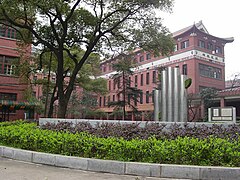Central South University – Wikipedia
From Wikipedia, the free encyclopedia
National university in Changsha, China
Central South University (CSU; 中南大学) is a national public university in Changsha, Hunan, China. The university is sponsored by the China Ministry of Education. It is a Chinese state Double First Class University. Hunan Medical University, Changsha Railway College, and Central South University of Technology merged to establish Central South University in April 2000.[4]
History[edit]
CSU was established by approval of the State Council on 29 April 2000 by merging three separate universities: Hunan Medical University (HMU), Changsha Railway University (CRU) and Central South University of Technology (CSUT).[4] HMU, formerly under the administration of the Ministry of Health, dates back to 1914 when Xiangya Medical College was founded through the joint efforts of Hunan Yuqun Society and the Yale-China Association. CRU, one of the universities under the administration of the Ministry of Railways, initially restructured in 1953 as Central South College of Civil Engineering and Architecture. It was established in 1960 based on its predecessor’s teaching and research divisions. CSUT, one of universities under the administration of the Ministry of Education, was originally named Central South Institute of Mining and Metallurgy in 1952 when a nationwide restructuring of institutes of higher education began. It incorporated departments of mining and metallurgy from six universities including Wuhan University, Sun Yat-sen University, Guangxi University, Hunan University, Nanchang University and Beijing Institute of Technology.
Academics[edit]
Central South University (CSU) is a national key university under the direct administration of the Ministry of Education of China and a member of the Double First Class University Plan, former nationally prestigious Project 211 and Project 985. CSU covers an area of 392.4 hectares with campuses located across the Xiang River at the base of the Yuelu Hill close to its neighbor Hunan University.
CSU offers 83 bachelor’s degrees, 282 master’s degrees and 142 doctorate degrees from 31 colleges and institutes and a graduate school:



- Literature and Journalism
- Foreign Languages
- Architecture and Art
- Business School
- Law School
- Marxism
- Public Administration
- Mathematics and Statistics
- Physics and Electronics
- Chemistry and Chemical Engineering
- Mechanical and Electrical Engineering
- Energy Science and Engineering
- Material Science and Engineering
- Powder Metallurgy Research Institute
- Traffic and Transportation Engineering
- Civil Engineering
- Metallurgy and Environment
- Geoscience and Environmental Engineering
- Info-physics and Geomatics Engineering
- Resources and Safety Engineering
- Minerals Processing and Bioengineering
- Information Science and Engineering
- Xiang-ya School of Medicine
- Pharmaceutical Sciences
- Public Health
- Basic Medical Sciences
- Stomatology
- School of Life Sciences
- Research Department of Physical Education
- School of Aeronautics and Astronautics
- Aier School of Ophthalmology
Faculties and students[edit]
More than 33,000 full-time undergraduates and 12,000 graduate students attend Central South University. Of the total number attending CSU approximately 1,000 are foreign students. The faculty-student ratio is about 1:8.
Facilities[edit]

CSU covers an area of 3,810,000 square meters and has the total floor space of 2,330,000 square meters. The library of CSU have a collection of more than 4,390,000 volumes.
CSU has six campuses:
- Main campus: dormitories and academic buildings for junior undergraduates and postgraduates of most engineering schools, two state key laboratories, as well as office buildings.
- South campus: dormitories for all freshman and postgraduates of all humanities schools, as well as office buildings.
- New campus: academic buildings for all freshman and all humanities and science postgraduates, as well as office and library buildings.
- Xiangya School of Medicine (New campus): dormitories and academic buildings for medical postgraduates, with Xiangya Hospital and the State Key Laboratory of Medical Genetics of China.
- Xiangya School of Medicine (Old campus): dormitories and academic buildings for medical undergraduates, with Third Xiangya Hospital and medical library.
- Railway campus: dormitories and academic buildings for junior undergraduates and postgraduates of civil engineering, traffic engineering, software engineering, and architecture, as well as office and library buildings.
Notable alumni[edit]
Academics[edit]
- Tang Feifan, medical microbiologist, best known for culturing the Chlamydia trachomatis agent in the yolk sacs of eggs, one of the earliest academician of Chinese Academy of Sciences.
- Zhang Xiaoqian, gastroenterologist, is considered the founder of gastroenterology in China. He served as President of Hsiang-Ya Medical College and Vice President of Peking Union Medical College, and was a founding member of both Academia Sinica and the Chinese Academy of Sciences.
- Huang Boyun, powder metallurgist, academician of Chinese Academy of Engineering, former President of the Central South University.
- Jin Zhanpeng, materials scientist, academician of Chinese Academy of Sciences.
- Wang Dianzuo, mineral engineering scientist, academician of Chinese Academy of Sciences, Chinese Academy of Engineering and National Academy of Engineering, former President of Central South University of Technology (now merged into the Central South university).
- Chen Zhiwu, professor of Finance at Yale School of Management and an influential public intellectual in China.
Politics and Public Service[edit]
Business and entrepreneurship[edit]
Global Rankings[edit]
US News Ranking: 209 (2023)
QS Ranking: 499(2023)
THES Ranking: 301–350(2022)
ARWU Ranking: 101–150(2022)
References[edit]
External links[edit]
Recent Comments